Hong Kong’s former pro-democracy media tycoon Jimmy Lai goes on trial Monday under the Beijing-imposed national security law and faces up to life sentence if convicted in a case which has sparked international concern.
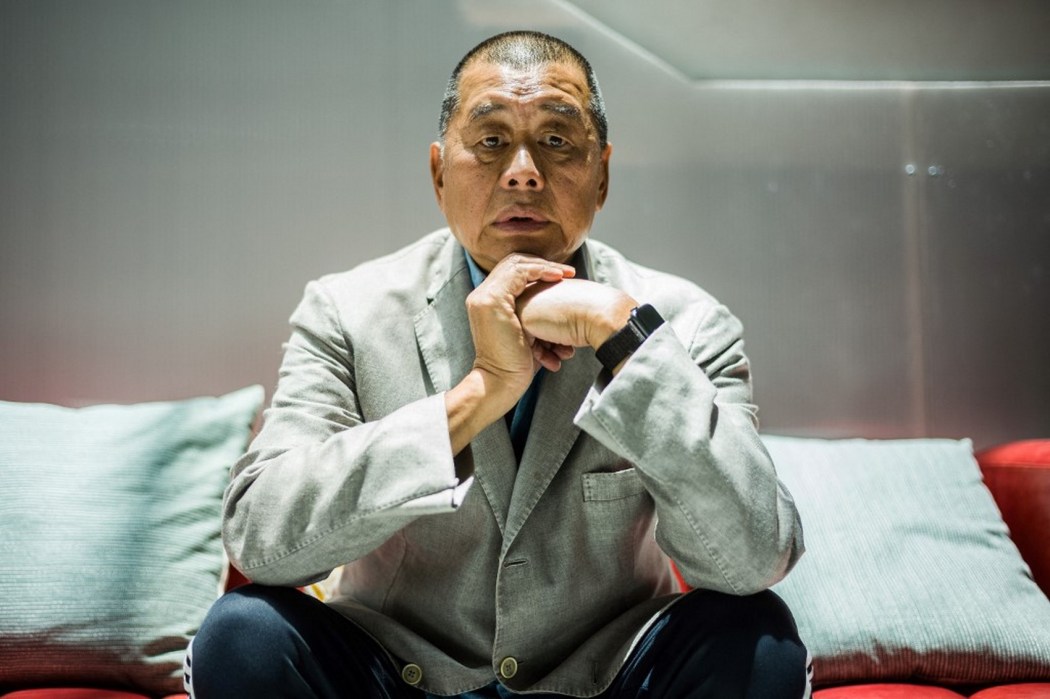
Lai, who turned 76 in prison on December 8, has been in custody since December 2020 and is currently serving a prison sentence for a separate fraud case. He stands accused of “conspiring to collude with foreign forces” and taking part in a conspiracy to publish “seditious materials.”
The trial, originally slated to begin last December, has been stymied by debates and delays, setting new legal precedents before it has even got underway and sparking Beijing’s first interpretation of the security law.
When Lai appears in court on Monday, he will already have been behind bars for 1,081 days.
Timeline of Jimmy Lai’s national security trial – Click to expand:
- August 10, 2020 – Police arrested Jimmy Lai on suspicion of colluding with foreign forces. Over 100 police officers raided the headquarters of Apple Daily.
- December 3, 2020 – Lai was arrested for alleged fraud and denied bail.
- December 11, 2020 – Lai was formally charged with “collusion with foreign forces,” becoming the first person to be charged with collusion under the national security law.
- December 23, 2020 – High Court judge Alex Lee granted bail to Lai on conditions including that he stayed at home except for court hearings and reporting to the police.
- December 31, 2020 – Lai was put in custody after the Court of Final Appeal (CFA) allowed the Department of Justice to appeal against Lai’s bail.
- February 9, 2021 – The CFA ruled in favour of the government and Lai’s bail was revoked.
- February 16, 2021 – Lai was arrested in custody on suspicion of assisting Andy Li abscond to Taiwan.
- February 18, 2021 – The High Court dismissed Lai’s bail application.
- April 1, 2021 – Lai, along with six other pro-democracy activists, was found guilty of organising and taking part in an “unlawful assembly” in August 2019. He was later sentenced to 12 months in prison for this offence. Lai was cleared of the organising conviction in August 2023. The case is still under appeal.
- May 28, 2021 – Lai, along with nine other pro-democracy activists, was sentenced to 14 months in jail for his “organising” role in a protest in October 2019.
- June 17, 2021 – Police raided Apple Daily a second time, arresting five senior executives including chief editor Ryan Law and Next Digital CEO Cheung Kim-hung. Police also froze HK$ 18 million worth of assets linked to Apple Daily.
- June 24, 2021 – Apple Daily issued its last edition after 26 years. Hundreds of supporters gathered outside its headquarters the night before as the tabloid went out of print.
- December 13, 2021 – Lai, along with seven other pro-democracy activists, was found guilty for organising, taking part in, or inciting others to join the banned Tiananmen crackdown vigil in 2020. He was sentenced to 13 months in jail.
- November 22, 2022 – Six senior executives of Apple Daily and its parent company Next Digital pleaded guilty to collusion.
- November 28, 2022 – Chief Executive John Lee invited Beijing to interpret the national security law to determine whether foreign counsels can participate in national security cases, after the government failed to block Lai from hiring British barrister Timothy Owen.
- December 1, 2022 – Lai’s trial was adjourned until December 13 while the city waited for Beijing to “clarify” whether overseas lawyers are allowed to appear in such cases.
- December 10, 2022 – Lai was sentenced to 5 years and 9 months in prison for fraud over a lease violation of the Next Digital headquarters.
- December 13, 2022 – Lai’s trial was adjourned again until September 25, 2023.
- December 30, 2022 – The Standing Committee of China’s National People’s Congress confirmed that Hong Kong’s chief executive and Committee for Safeguarding National Security had the authority to decide whether overseas lawyers could take part in national security trials.
- August 18, 2023 – During a pre-trial review, Lai’s collusion trial was further postponed until December.
- September 26, 2023 – Lai’s 1,000th day in custody. International groups called for his release, while the government slammed such demands as “slanderous.”
- December 18, 2023 – Lai’s collusion case begins.
Ahead of the trial which is expected to last for 80 days, HKFP takes a look at Lai, Apple Daily, and what to expect from proceedings.
Who is Jimmy Lai?
Lai, a staunch supporter of the city’s pro-democracy movement and a long-term critic of China’s ruling Communist Party, came to Hong Kong as a child in what was once a typical rags-to-riches story in the city.
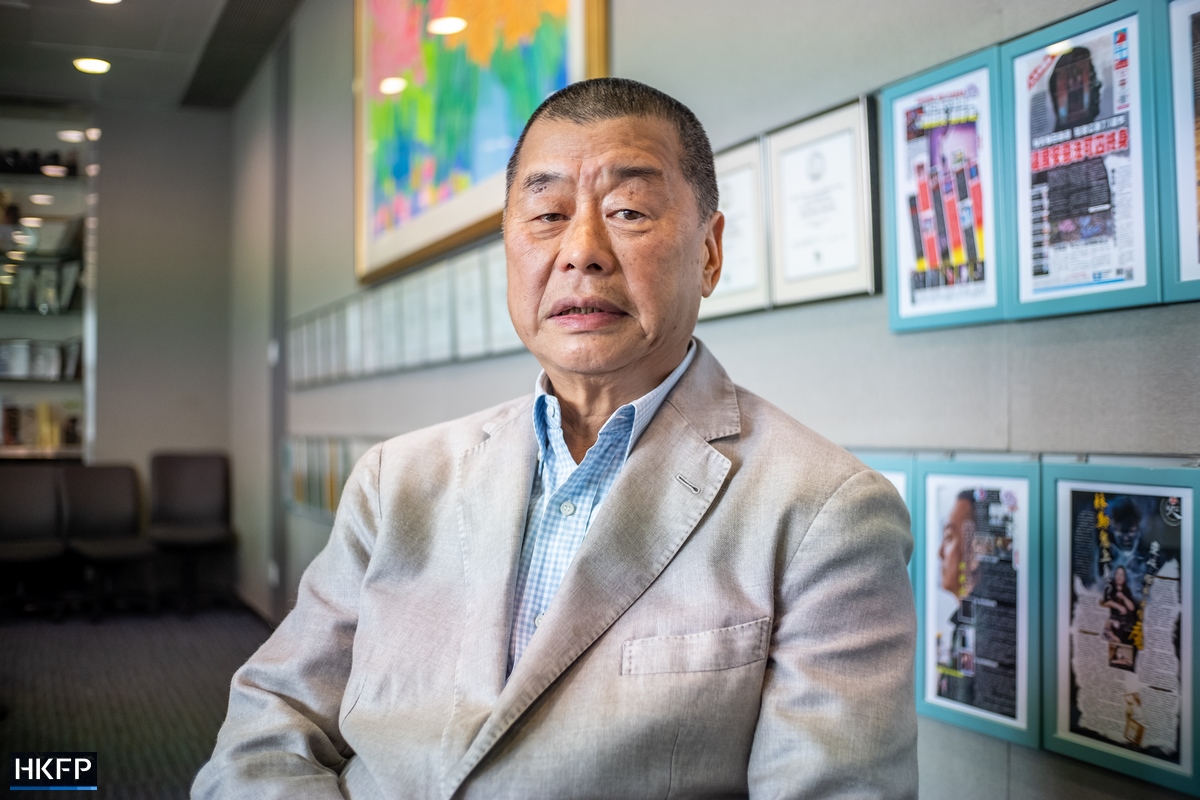
In I am Jimmy Lai, his autobiography published in 2007, he described a childhood shaped by the upheavals of communist China. He was born in Guangdong province into a wealthy family but his father fled to neighbouring Hong Kong soon after the communists took power in 1949 and his mother was sent to a reform camp. Lai had to work as a child labourer to make ends meet for himself and his siblings.
Lai smuggled himself into Hong Kong at the age of 12, toiled in garment factories, taught himself English and worked his way upwards. In 1981, he founded the hugely successful clothing brand Giordano.
But unlike many of his contemporaries, Lai was a relentless critic of the Chinese Communist Party. In the wake of the 1989 Tiananmen crackdown, when China sent tanks and troops into Beijing’s Tiananmen square to crush months of student-led demonstrations, he turned his attention to the news media.
The following year he founded Next magazine in which he penned a column regularly criticising China’s leadership. He sold all his shares in Giordano after Chinese authorities began closing its clothing stores in the mainland in response. In 1995, he founded the pro-democracy tabloid Apple Daily.
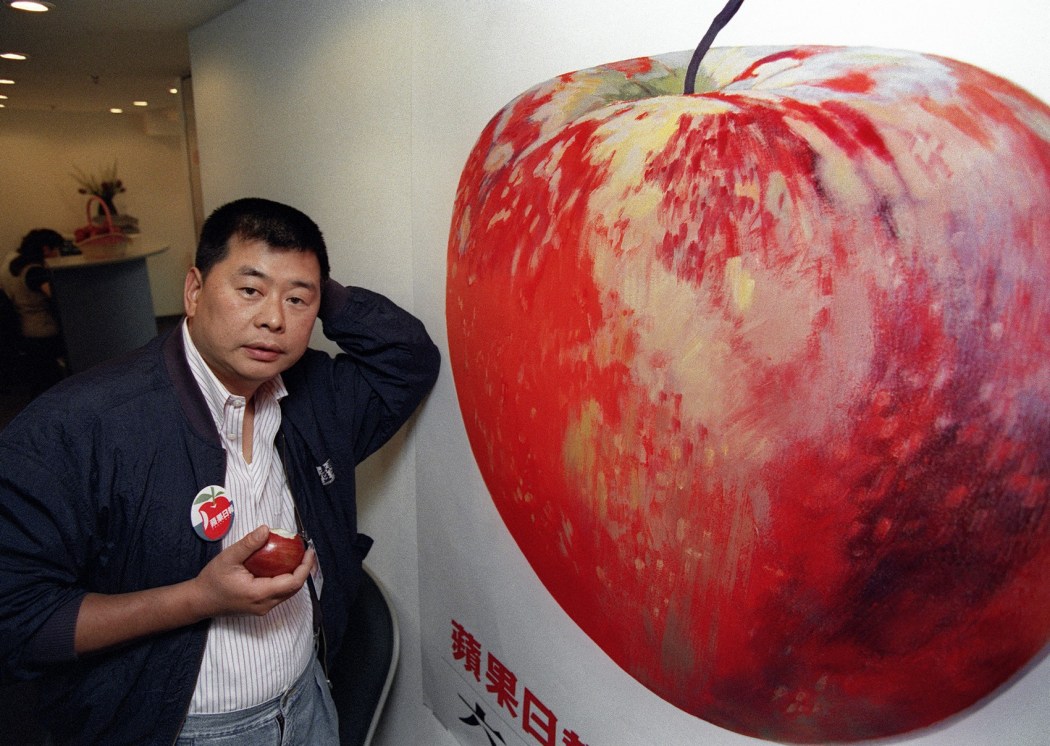
Lai’s criticism of Beijing made him an outlier among media moguls in Hong Kong. According to Ma Ngok, a political scientist at the Chinese University of Hong Kong, in the run-up to the city’s Handover from British to Chinese rule, Beijing was gradually co-opting Hong Kong media owners by inviting them onto official Chinese bodies.
But not Lai. After the Handover, he became a regular donor to the city’s opposition groupings, including the Democratic Party and the now-disbanded Civic Party.
Over the past decade, Lai was also an active supporter of the pro-democracy movement amid growing concern about Beijing’s perceived encroachment of Hong Kong’s promised autonomy. He was arrested in 2014 for taking part in a sit-in during the 79-day Umbrella Movement, in which hundreds of thousands of Hongkongers demanded democracy.
In 2019, when an extradition amendment bill sparked city-wide protests and unrest, Lai was among the activists who led a million-strong march on June 9 calling for the bill to be withdrawn. He visited the US in July that year and met then Vice-President Mike Pence and Secretary of State Mike Pompeo to discuss the city’s situation.

He also joined at least three other peaceful protests in 2019 and 2020, for which he was convicted of organising and participating in “unlawful assemblies” and sentenced to a total of 20 months in jail in 2021.
Lai was first arrested on collusion charges in August 2020, within weeks of Beijing imposing a sweeping national security law on Hong Kong to quell dissent. It criminalised secession, subversion, terrorism, and collusion with foreign forces.
He was initially granted bail but was remanded in custody that December following a government challenge against his temporary release. The city’s top court eventually ruled in favour of the government and revoked Lai’s bail.
Lai is currently being held in Stanley Prison, a maximum-security facility, where he has reportedly been kept in solitary confinement. He is serving another sentence of five years and nine months for fraud over a violation of lease conditions at the Apple Daily headquarters, which was handed down in December last year.

Last month, a group of international Catholic leaders called for the immediate release of Lai, who is a Catholic, saying the legal actions against him amounted to “persecution.” The government slammed the call as “fact-twisting” and an interference in the city’s internal affairs.
Britain’s Foreign Secretary David Cameron on Tuesday met Lai’s son Sebastien, who leads an international campaign for his father’s release, in London. The Foreign Office said “the UK opposes the National Security Law and will continue to stand by Jimmy Lai and the people of HK”. China slammed what it called Britain’s “malicious intentions” over the meeting.
What was Apple Daily?
Apple Daily, founded in 1995, was Hong Kong’s first full-colour newspaper. Its first issue sold over 200,000 copies and within two months it had become the second-best selling newspaper in the city, behind Oriental Daily.
According to Chan Yan-chong, the first vice director of Apple Daily, Lai had invested HK$700 million to launch the paper in what he called a “gamble.”

It was a gamble that paid off. In Apple Daily’s early days, the combination of wild, colourful journalism – including extensive use of paparazzi and sensational content – won the tabloid a huge readership, despite criticism of its sensationalism and vulgarity.
But Apple Daily also had a clear pro-democracy stance. In 2003 it was the most vocal news outlet against a plan to pass the city’s own security legislation, which sparked a protest by half-a-million Hongkongers on July 1, the anniversary of the Handover.
When July 1 became an annual day of protest, the paper gave it full coverage every year. It also gave extensive coverage to the annual June 4th candlelight vigil held to commemorate those who died during the 1989 Tiananmen crackdown. Its editorials and columnists were predominantly critical of China and supportive of the city’s pro-democracy movement.
Media scholar Grace Leung of CUHK described the pro-democracy tabloid as “a strange hybrid of frivolity and seriousness.”
In 2014 and 2019, Apple Daily showed solidarity with protesters calling for democracy. On its front page on July 1, 2020, it described the Beijing-imposed national security law as a “draconian law which had put a nail in the coffin of ‘one country, two systems’,” the city’s governing framework.
According to a CUHK survey on the perceived credibility of the city’s newspapers, Apple Daily was the only newspaper whose rating increased between 2013 and 2019, a period coinciding with large-scale pro-democracy movements in the city. In 2019, the last time the triennial survey featured Apple Daily, the pro-democracy tabloid received a score of 5.71 points, behind only the South China Morning Post and Ming Pao.
On August 10, 2020, when its founder Lai was first arrested by national security police, over 100 police officers raided the headquarters of Next Digital, where Apple Daily was located. No editorial staff were arrested on that day, but on June 17, 2021, in a subsequent raid, five senior executives were arrested on suspicion of collusion over allegedly publishing articles which called for international sanctions on Beijing or the city.
The government also froze HK$18 million worth of assets linked to Apple Daily.

Those arrested included Next Digital’s CEO Cheung Kim-hung, Apple Daily’s Editor-in-Chief Ryan Law and Associate Publisher Chan Pui-man.
In the following days, three more senior editorial staff were arrested including Fung Wai-kong, ex-editor-in-chief of the English news section, Lam Man-chung, former executive editor-in-chief, and Yeung Ching-kee, lead opinion writer.
On June 23, 2021, Apple Daily announced it would publish its last edition the next day. Large crowds of supporters gathered outside its headquarters in the rain that night.
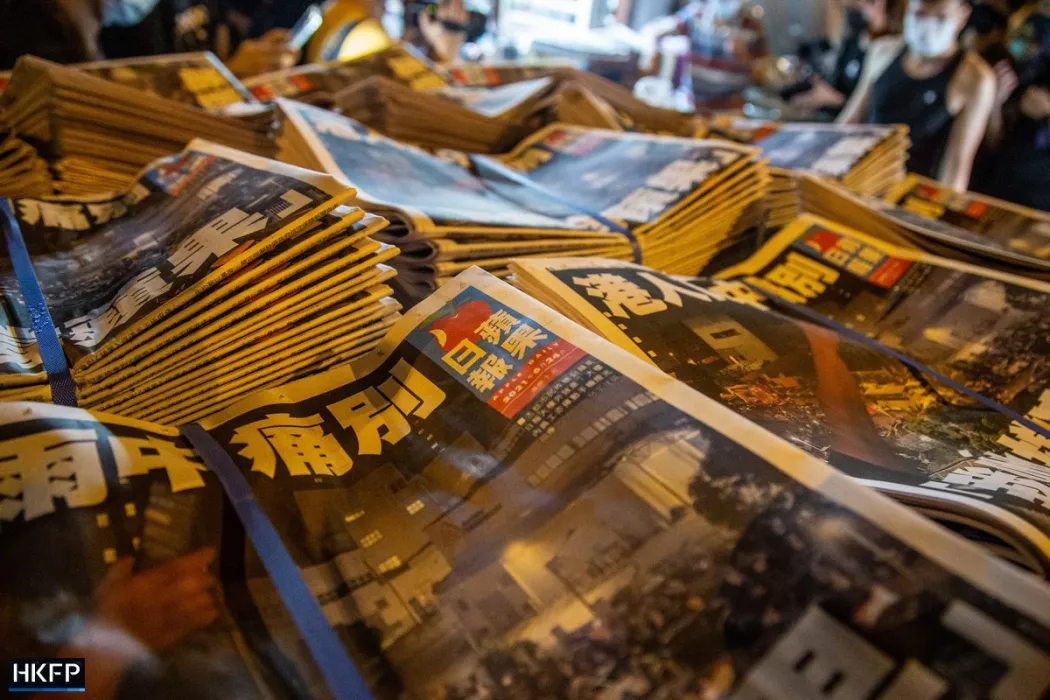
A million copies of the last edition were printed and distributed on June 24, marking the end of the pro-democracy tabloid after 26 years.
What is Jimmy Lai accused of?
Lai faces two counts under the Beijing-imposed national security law of conspiring to collude with foreign forces. If convicted, he faces up to life in prison.
A third national security charge – collusion with foreign forces – has been left on file, meaning that while the prosecution reserves the right to proceed with the charge, it cannot do so without a judge’s permission.
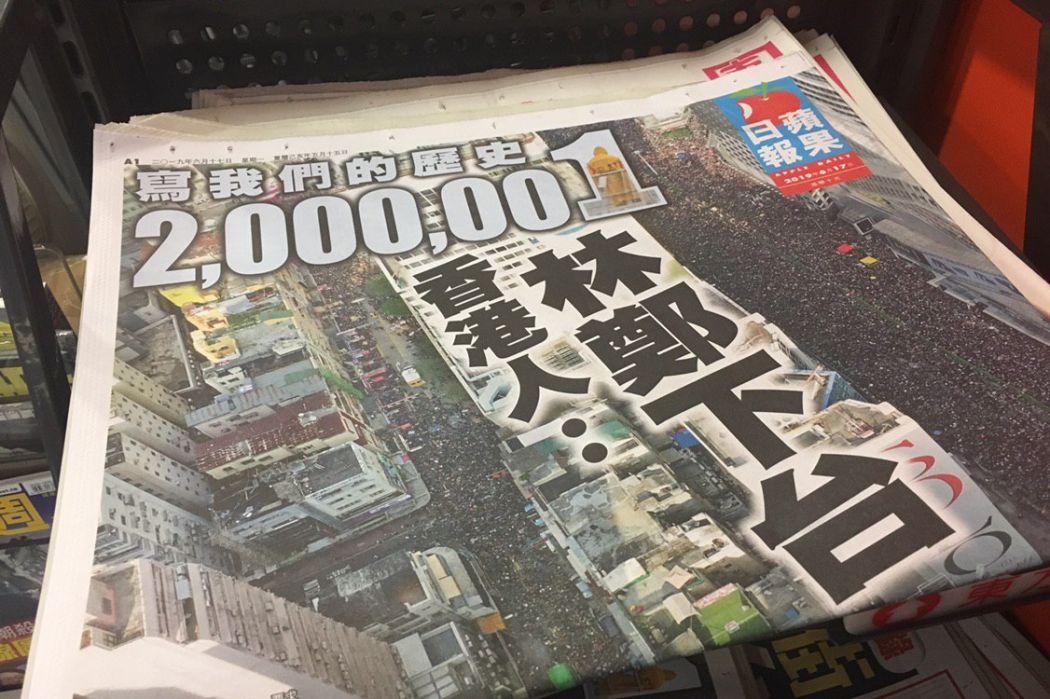
The Apple Daily founder is also accused of conspiracy to print, publish, sell or distribute “seditious publications” between April 2019 and June 24, 2021. Sedition carries a maximum penalty of two years in prison for a first offence.
The charges have also been laid against three companies under Apple Daily’s parent company Next Digital – Apple Daily Limited, Apple Daily Printing Limited, and AD Internet Limited.
Why was Jimmy Lai’s trial delayed?
The first adjournment was announced even before proceedings began, when Chief Executive John Lee said on November 29, 2022 – two days before Lai was due in court – that the secretary for justice would apply to adjourn the trial.
The move came after Lee invited Beijing to interpret the national security law and determine whether overseas lawyers could take part in national security trials. His comments came hours after the city’s top court upheld an earlier court decision to allow UK barrister Timothy Owen to represent Lai.
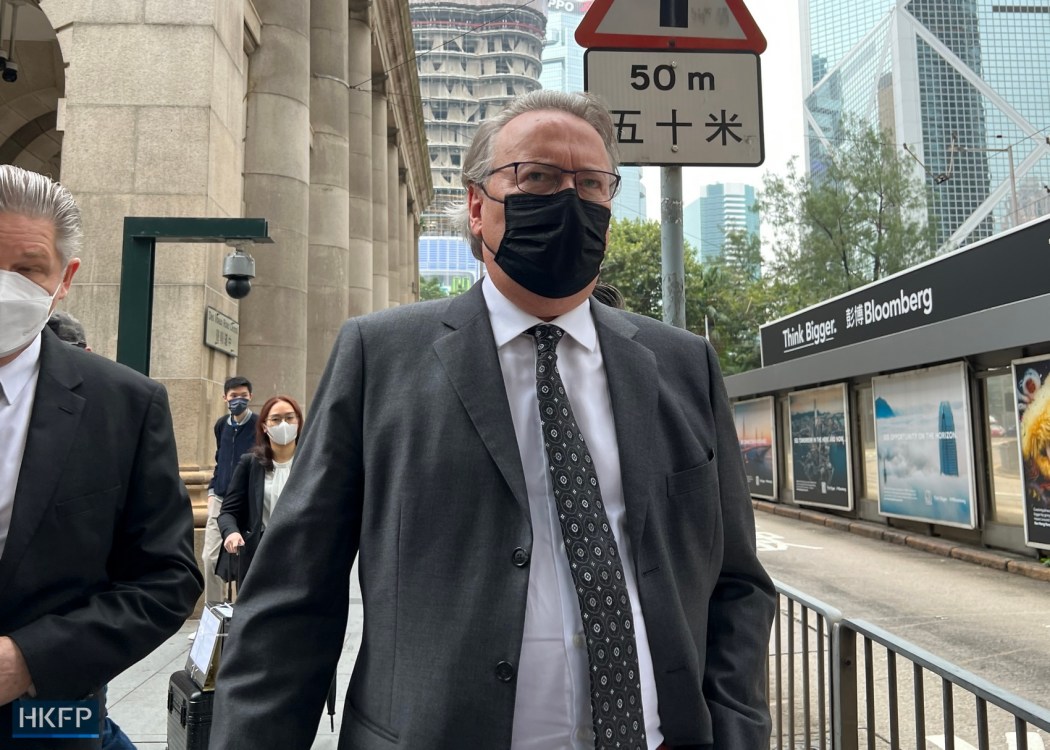
Lai’s intention to hire Owen, a King’s Counsel (KC) and specialist in criminal, public and human rights law, was revealed in court in September 2022. KCs, the equivalent of senior counsels in Hong Kong, need official permission to appear in the city’s courts.
While Lai’s request was opposed by the secretary for justice and the Hong Kong Bar Association, the High Court in October 2022 approved it as “clearly in the public interest.”
That decision was twice appealed by the Department of Justice, at the Court of Appeal and the Court of Final Appeal, but each time in vain.
Thus, rather than beginning as planned on December 1 last year, the trial was adjourned until December 13 as the city awaited Beijing’s interpretation on overseas lawyers. Owen was not in court that day, although he was in Hong Kong, with Lai’s barrister Robert Pang saying that Owen’s application for a work visa extension had been “withheld” by the Immigration Department for “reasons best known to” the department.

But Beijing’s decision was not delivered by December 13, and so Lai’s trial was adjourned for a second time until September 25.
On December 30 the Standing Committee of China’s National People’s Congress said Hong Kong’s chief executive and Committee for Safeguarding National Security had the authority to decide whether overseas lawyers could take part in national security trials.
See also: Explainer – Beijing’s first interpretation of Hong Kong’s national security law
The interpretation was met with condemnation from international diplomats, which was rebuffed by Hong Kong and Beijing authorities. It also sparked an amendment to the Legal Practitioners Ordinance, essentially removing the courts’ power to admit foreign barristers for cases involving national security without first receiving permission from the chief executive.
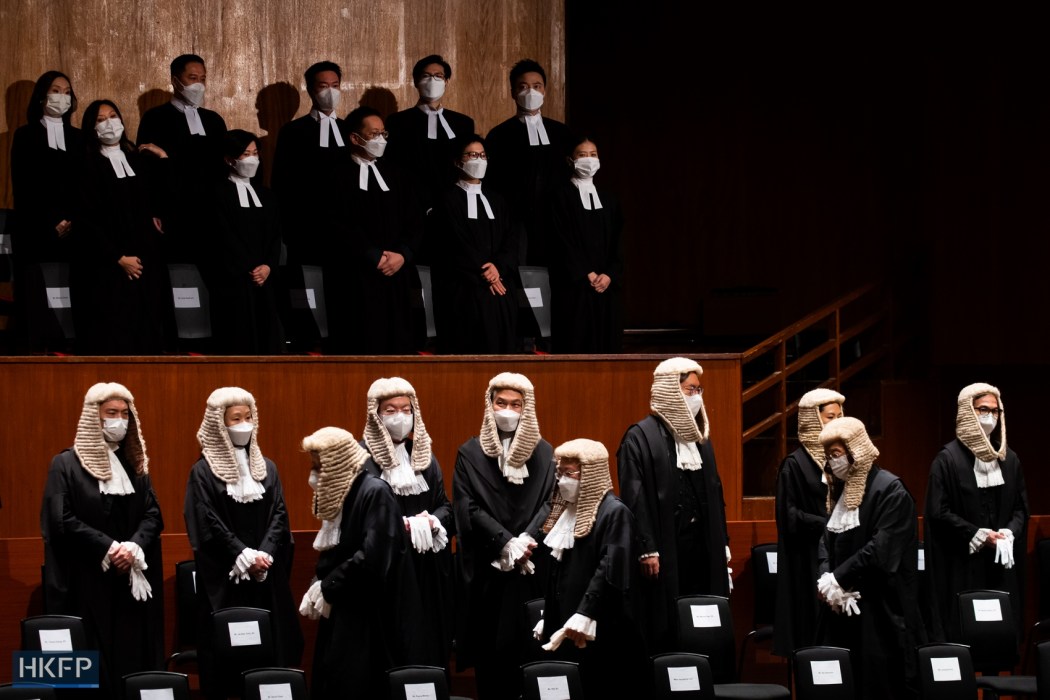
Lai in February sought to prevent Beijing’s interpretation from affecting the High Court’s decision to allow Owen to represent him. Two months later, his lawyers launched a legal challenge against the director of immigration and the city’s national security committee, after it was revealed that the committee had decided in a private meeting in January that Owen’s participation in Lai’s case would harm national security.
The committee also advised the director of immigration to reject any visa applications from Owen regarding the case.
That challenge was rejected in May, with Chief Judge of the High Court Jeremy Poon ruling that the city’s courts did not have jurisdiction over the national security committee.
Lai has sought to appeal that decision, with a hearing set for April 16 next year. Last month, talks by Owen at the University of Hong Kong and a private members’ club were cancelled, with the university citing “unforeseen circumstances.”
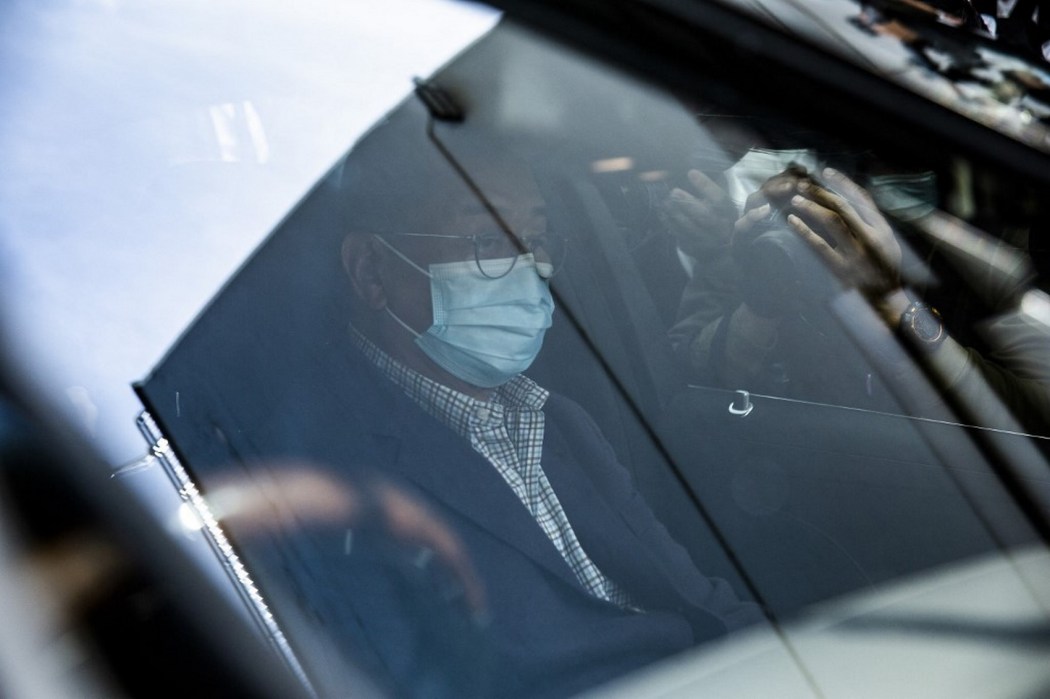
While the saga involving Owen was playing out, Lai’s legal team was busy trying to block a national security search warrant for Lai’s phones. The devices were said to contain thousands of items identified as journalistic material, which is supposed to be protected from police search and seizure. However, the courts rejected three attempts to block the warrant – in August and October last year, and again in June.
An effort to halt the national security trial against Lai was dismissed in May. Last November, his lawyers had applied for a permanent stay of proceedings, arguing during a hearing in May that blocking Owen from representing Lai was “persecution not prosecution.”
Lai’s barrister Pang also said there was a lack of transparency surrounding the appointment of national security judges, who are handpicked by the chief executive.
These arguments were unanimously rejected by a panel of three High Court judges – Esther Toh, Susana D’Almada Remedios, and Alex Lee – the same trio who will oversee Lai’s trial when it begins on Monday.
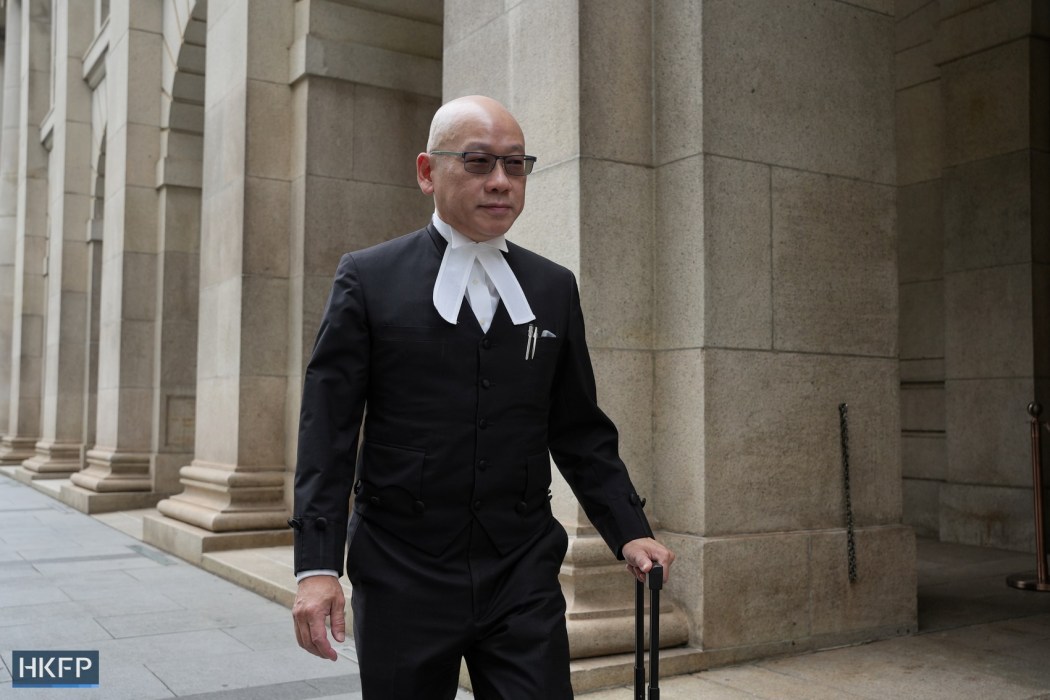
As has been the case for other national security trials, Lai’s will proceed without a jury. Trial by jury has been a key feature of Hong Kong’s common law legal system. However, cases under Beijing’s security law can be tried by a panel of judges instead of a jury, a practice that a UN human rights committee has called “very concerning.”
In a pre-trial review in August, a little over a month before the then-September trial date, proceedings were adjourned until December 18, this time to give Judge Lee time to finish overseeing another landmark security case involving 47 pro-democracy defendants.
Lai’s trial was also in the headlines after some US lawmakers proposed a bill that would see sanctions placed on 49 Hong Kong judges, prosecutors, and officials. This sparked debate over whether “significant” national security cases could be heard instead in mainland China.
Last month, Justice Secretary Paul Lam said he was “100 per cent confident” that Hong Kong could handle Lai’s case.
What do we know about the trial?
Lai’s closely watched trial – which has been framed internationally as a bellwether for press freedom in Hong Kong, although authorities maintain that it has nothing to do with the issue – is scheduled to last for 80 days.

Lai has yet to formally enter his plea, which, procedurally, could be expected on Monday. However, during a pre-trial review in August, Judge Lee said it was “reasonable” for the defence to challenge the six-month limitation of the sedition charge against Lai – which related to materials published until June 24, 2021, and was pressed against him in December 28 that year. The court would have to resolve the issue before hearing Lai’s plea, Lee added.
The defence also said that Lai would likely seek clarification from the judges on whether evidence dated before the enactment of the national security law was admissible.
During the same session, lead prosecutor Anthony Chau said his team was in the process of translating some 4,000 to 5,000 pages of Chinese documents into English. He estimated the translation would be completed in late September.
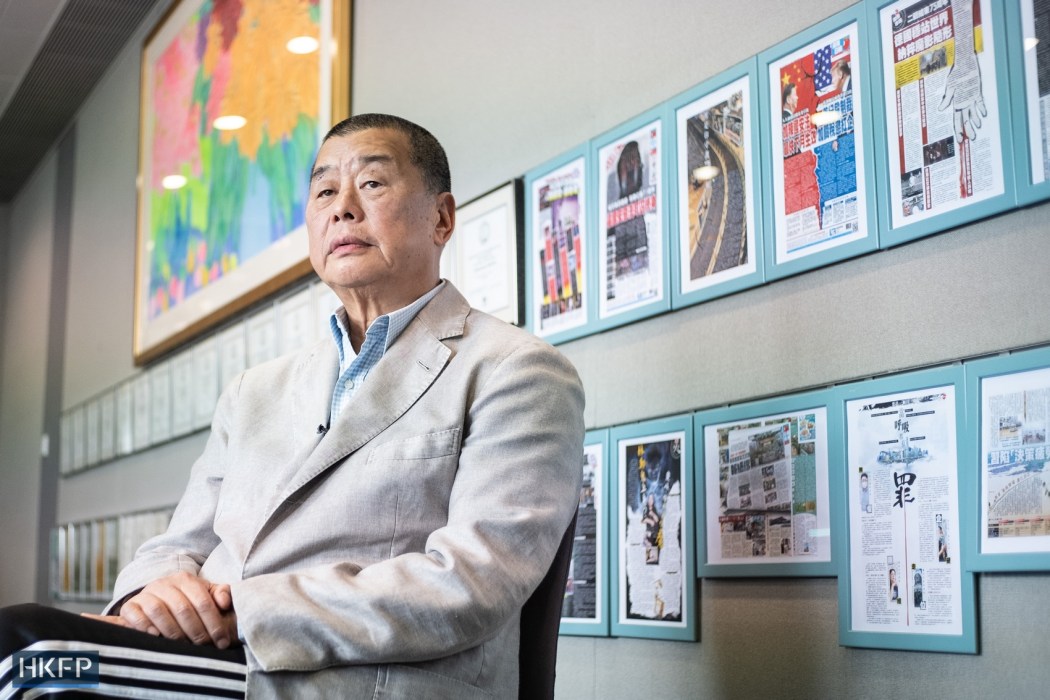
Activist Andy Li and paralegal Chan Tsz-wah, who pleaded guilty in August 2021 to conspiring with Lai to collude with foreign forces, are set to take the stand to testify against him.
Some of the six senior executives who pleaded guilty to the collusion charge last year are also set to take the stand as prosecution witnesses, including former Next Digital CEO Cheung Kim-hung, according to the defence.
They will all be sentenced after Lai’s trial.
Former chief operating officer at Next Digital Royston Chow, who was arrested during the second police raid of Apple Daily and granted immunity for testifying against Lai in the fraud case, will also testify against his former boss in this trial.
As for defence witness, the defence has said it may call an expert witness relating to the use of messaging app Signal.
Support HKFP | Policies & Ethics | Error/typo? | Contact Us | Newsletter | Transparency & Annual Report | Apps
Help safeguard press freedom & keep HKFP free for all readers by supporting our team























